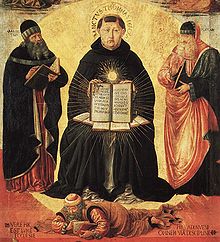
Back البراهين الخمسة Arabic Cinc vies Catalan Quinque viae Spanish براهین پنجگانه Persian Quinque viae French Cinque vias Interlingua Quinque viae ID Cinque vie (Tommaso d'Aquino) Italian 다섯 가지 길 Korean Penki keliai į Dievą Lithuanian

| Part of a series on |
| Thomas Aquinas |
|---|
 |
The Quinque viæ (Latin for "Five Ways") (sometimes called "five proofs") are five logical arguments for the existence of God summarized by the 13th-century Catholic philosopher and theologian Thomas Aquinas in his book Summa Theologica. They are:
- the argument from "first mover";
- the argument from universal causation;
- the argument from contingency;
- the argument from degree;
- the argument from final cause or ends ("teleological argument").
Aquinas expands the first of these – God as the "unmoved mover" – in his Summa Contra Gentiles.[1]
- ^ "Contra Gentiles I.13". Dominican House of Studies. Archived from the original on October 20, 2012.
© MMXXIII Rich X Search. We shall prevail. All rights reserved. Rich X Search